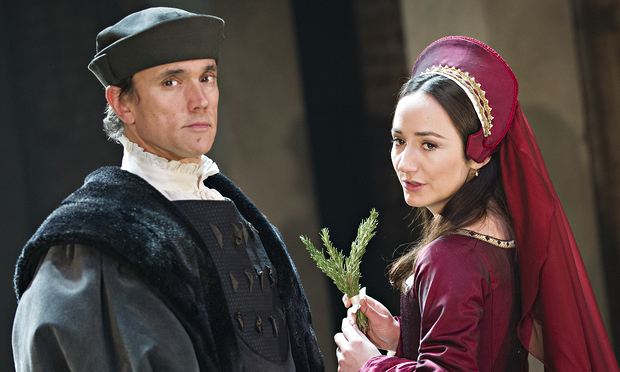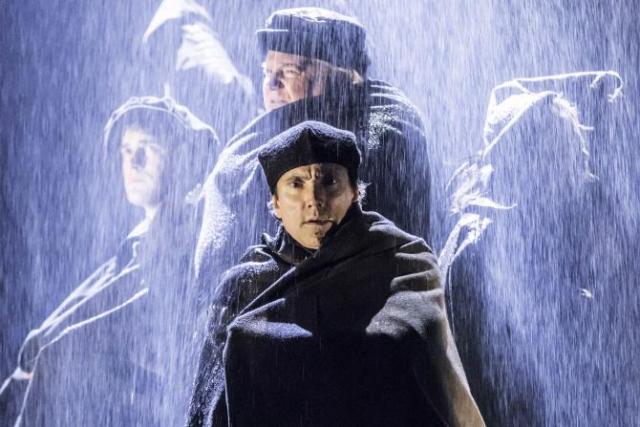

Wolf Hall is a great theatrical spectacle. The Royal Shakespeare Company is composed of arguably the finest English speaking actors in the world. There is pageantry, a gripping storyline, and even a little education thrown in for good measure. It’s also over-long, over-written, repetitive, and sometimes boring. Throw in the fact that the stage is kept dark and smoky most of the time, and you may be in for a very expensive snooze.
It’s recommended that both Part I and Part II be seen in the same day, the better to appreciate the experience. There’s plenty of time to dine nearby, but go easy on the wine. Although Part II purports to be under three hours, the evening we were there, it was well over. I’d advise brushing up on your English history. The central figure in the drama is not Henry VIII and his six wives (“divorced, beheaded, died…”) but rather one Thomas Cromwell, whose place in history is largely unknown to American audiences. He’s a man of humble breeding, the son of a blacksmith, as he’s reminded time and again by those around him. He manages to rise first as a lawyer, as a protégé of Cardinal Wolsey, and then as Chief Minister to the King. Along the way, he attains the title Earl of Essex and the office of Lord Chancellor.
Ben Miles takes up the mantle of Cromwell with apparent ease. He’s shackled by the characterization of the man as being introspective, grim, almost taciturn. What a delight it will be to see him display the charm he’s able to show in his curtain call; his smile to the standing ovation of the audience warms up what’s otherwise a decidedly chilly evening.
PBS viewers, whom we must expect fill the house, will recognize Nathaniel Parker as the popular “Inspector Lynley.” As Henry VIII, his moony expression as he contemplates his next great love, Jane Seymour (Leah Brotherhead), is worth the price of admission. We see a mousy girl rhapsodized into a goddess in his eyes. Parker has a natural elegance; we have no trouble accepting him immediately as a royal personage. But visually, he too often gets lost in the crowd of dark haired, bearded men all in similar clothing. Would that he were clad in his white outfit throughout. Or, better yet, why not follow the example of the current “Wolf Hall” TV miniseries, and make the maniacal monarch the redhead he was in reality. The shade needn’t be that of the gloriously blazing ginger Damian Lewis; a touch of auburn would be both in order, and distinguishing.
I’m somewhat at a loss to understand why Jeremy Herrin has chosen to direct Lydia Leonard to portray Anne Boleyn as totally without charm. Surely a woman who enchanted so many men and won the hand of the King must have had allure. Here, she’s by turns angry, sullen, and vindictive. It’s much easier to accept the beguiling Anne in the TV drama “The Tudors,” as played by Natalie Dormer. After all, even Anne’s detractors found her bewitching. And why is Katherine of Aragon (Lucy Briers) presented as being so totally unsympathetic? The stilted accent doesn’t help, but surely we in the audience should be allowed to feel compassion for the discarded wife.
The actors double, and in some cases triple, in roles. This can be confusing. When and how did the funny, lusty Mary Boleyn (Olivia Darnley), sister of Anne and Henry’s ex-mistress, turn into Mary Shelton, lady-in-waiting?
Paul Jesson is jolly and sympathetic as the imposing Cardinal Thomas Wolsey, Lord Chancellor. We understand Cromwell’s loyalty to the man, even after his death. It comes as somewhat of a shock to an American audience to see Sir Thomas More (John Ramm) presented as a villain. He’s a narrow-minded book burner, and his purported torture chamber makes him a man who is feared. And this is the guy who’s a saint, right? There are some impressive effects; court is presented as a dance. Fire comes up from the floor, and sets the scene. Snow falls as the coffin of Cromwell’s wife is carried off; from then on, his heart seems largely frozen.
The play is often thought provoking; it’s pointed out that in the bible, there is no mention of popes, nuns, or Rome. So, of course, the clergy at the highest level didn’t want an English bible which will be read by the populace.
Audience members may well find this production to be Shakespearean in tone. It could also be said to be A Man For All Seasons in reverse. Will there be a sequel, perhaps Part III and Part IV? Cromwell’s tale is far from over. If yes, a word to the wise: look out for a troublesome queen who’s yet to come, Anne of Cleeves.
